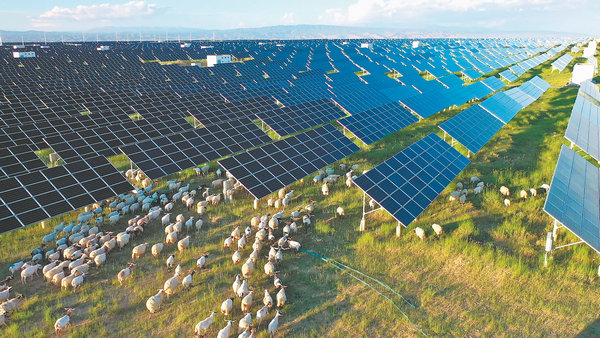

By the time the sun rises over the rolling grasslands of Qinghai province's Gonghe county, 42-year-old Zhao Guofu is already tending to his flock. Sheep dot the pastures like soft clouds beneath a vast sea of photovoltaic panels that stretch as far as the eye can see.
For Zhao, this is more than a daily routine; it's a homecoming.
"I grew up herding sheep here," he says, recalling his childhood in Hainan Tibetan autonomous prefecture. But as the grasslands degraded and income from sheep dwindled, he had no choice but to leave. For two decades, Zhao joined millions of others in China's wave of migrant workers, laboring far from the open skies he loved.
Six years ago, he returned to a transformed landscape. He found the land rejuvenated, thanks to large-scale ecological restoration and a pioneering renewable energy project.
Where Zhao once struggled to keep 100 or 200 sheep alive, today he manages a thriving flock of 800.
"I enjoy this free way of life," he says.
But grazing isn't his only livelihood anymore. The grasslands he once roamed are now part of Qinghai's 10 million kilowatt new energy base. While his sheep nibble at the grasses beneath the solar panels, Zhao helps maintain the power station, earning a steady second income.
"The panels don't just make electricity; they shelter the grass and protect the soil," Zhao explains. "Even in winter, there's enough for the sheep to graze without moving them between seasonal pastures."
His return has paid off in more ways than one. Zhao's income has doubled and he now owns a small apartment in the county, and his child goes to school there.
Zhao's story is far from unique. Across Qinghai, thousands of herders like him are seeing their lives transformed by the province's innovative "livestock and photovoltaic complementarity" model.
The concept is as elegant as it is practical: On the surface, photovoltaic panels harvest sunlight for power; below, sheep graze, controlling weeds that could otherwise entangle panels or pose fire risks. It's a win-win for clean energy production and ecological restoration.
The impact is measurable. According to Wang Anwei, director of Hainan prefecture's energy bureau, the panels reduce surface wind speeds by 50 percent and evaporation by 30 percent, helping vegetation recover.
"The organic matter returning to the soil is a direct result of ecological conservation efforts," Wang says. To accommodate both equipment and livestock, the panels are elevated 1.5 meters above the ground, he adds.
Across the province, more than 100,000 square kilometers of desertified land are suitable for clean energy development. But so far, only 800 sq km have been tapped, leaving enormous potential, says Zhang Jingang, executive vice-governor of Qinghai province.
By the end of 2024, Qinghai's 10 million kilowatt new energy base had connected 30.66 million kilowatts of clean energy to the grid, accounting for over 46 percent of the province's clean energy capacity. The initiative has created an integrated system of hydropower, solar PV, wind, solar thermal, and energy storage — what Zhang calls a "five-in-one" clean energy ecosystem.
In Gonghe county's Talatan Photovoltaic Industry Park, the transformation has been profound. Vegetation coverage in the park has surpassed 80 percent, up 20 percentage points from 2020, Zhang says.
The park's development has directly benefited 15 village collectives and 3,827 herding households, creating new income streams while restoring fragile ecosystems.
"We follow the principle of co-building, co-governing, and sharing ecological civilization," Zhang says. "We've creatively established public welfare jobs for ecological stewards. Across the province, 146,000 herders have set down their whips and are now earning a living protecting the environment."
For Zhao, the changes are tangible, not just in his income, but in the cleaner air, the richer soil, and the renewed sense of possibility for his hometown.
Zhao's life now includes not only herding sheep, but also helping to clean the solar panels, and serving as a guardian of his homeland's environment.
Under this glittering canopy, life feels freer, and more fulfilling, than Zhao ever imagined.